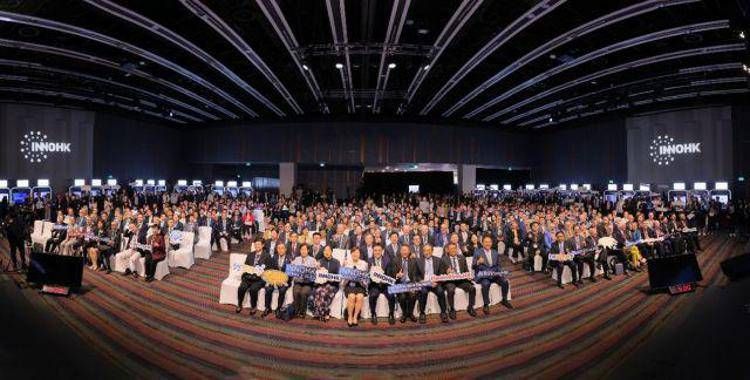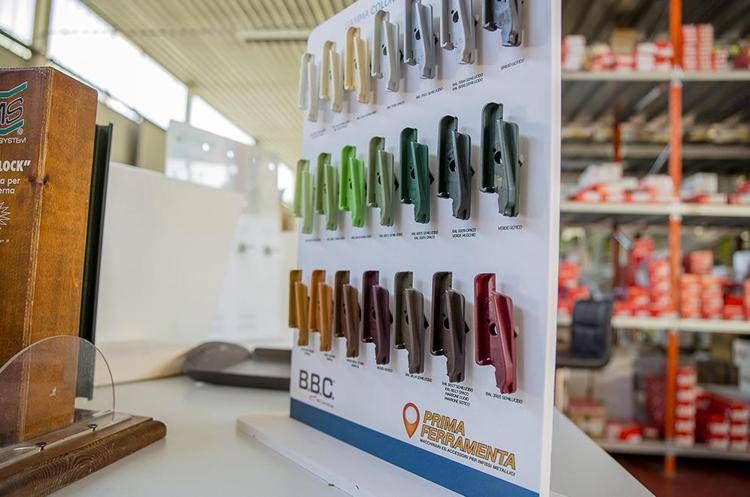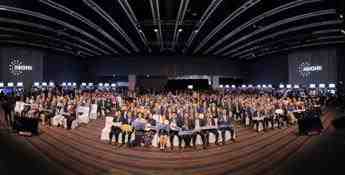Over 800 local and international academics and scientists attended the InnoHK Summit 2023

Showcasing the latest developments in life sciences, AI and robotics, paving way to Hong Kong as an international science and research hubShowcasing the latest developments in life sciences, AI and robotics, paving way to Hong Kong as an international science and research hub
HONG KONG SAR - Media OutReach Newswire - 6 December 2023 - Organised by the Innovation and Technology Commission and the Hong Kong Science and Technology Parks Corporation (HKSTPC), InnoHK Summit 2023 was held successfully in Hong Kong Science Park today (December 6), attracting over 800 world-class academics, scientists, representatives of renowned institutes and industry leaders from Hong Kong and around the world. Under the theme of "From Collaborative Research to Real World Impact", the Summit aims to showcase the latest innovation and technology (I&T) developments and breakthroughs of InnoHK, Hong Kong's leading role as a global research collaboration hub, and its strengths in commercialisation and talent development.
The Chief Executive, Mr John Lee, gave his welcoming at the Summit by video. Mr Lee said that the InnoHK initiative strives to build a global network of mutual learning and advancement, and the Summit is testimony to the importance attached by the HKSAR (Hong Kong Special Administrative Region) Government to international collaboration for knowledge advancement, addressing global issues, and transforming scientific findings into innovations that benefit humankind. He encouraged the Summit's participants to draw on the spirit of collaboration, and make lasting connections that would lead to more scientific breakthroughs and innovations in Hong Kong.
Speaking at the forum, the Secretary for Innovation, Technology and Industry, Professor Sun Dong, said that Hong Kong has always been an open cosmopolitan with a diverse community and remains the only place in the world where global connectivity and the China advantage come together. With the staunch support from the motherland's National 14th Five-Year Plan, and the opportunities brought by the development of the Guangdong-Hong Kong-Macao Greater Bay Area, Hong Kong is well positioned for I&T development. The Chief Executive had announced the establishment of a new InnoHK research centre focusing on Generative AI in his newly released Policy Address and the preparation for the establishment of the third InnoHK research cluster focusing on advanced manufacturing, materials, energy and sustainable development would commence next year.
The Founding President of the Hong Kong Academy of Sciences and Chairman of the InnoHK Steering Committee, Professor Tsui Lap-chee, pointed out in his speech that the exchange of knowledge and ideas by people from different parts of the world has always been crucial to stimulating advances in science and technology while turning scientific findings into solutions with real-world impact requires the collaboration among the academia, industry, government and civil society that transcends traditional sector boundaries. He emphasised that InnoHK encapsulated the two dimensions of collaboration by connecting institutions and researchers across Asia Pacific, Europe and North America and encouraging them to work with the industry to translate their research outcomes into applications.
The Chief Executive Officer of the HKSTPC, Mr Albert Wong, also spoke at the forum. He stated that InnoHK is unique due to Hong Kong's high concentration of top researchers and universities, its international connections, and robust government support for I&T. HKSTP is committed to focusing on research and its practical application. It will continuously enhance the ecosystem by attracting more participants, investment funding, and additional resources to solidify Hong Kong's role as a global powerhouse of innovation and technology.
The Summit invited representatives from 28 research laboratories of two InnoHK clusters, namely Health@InnoHK, focusing on healthcare technologies, and AIR@InnoHK, focusing on artificial intelligence and robotics technologies to present their latest breakthroughs resulted from their collaborative research. They also shared the challenges faced, and set out targets and vision for future researches.
Also, the summit provided a platform for experts from leading local and international universities and industry representatives to exchange valuable insights on I&T topics, covering life sciences' research and development (R&D), artificial intelligence and commercialisation of R&D outcomes, during three panel discussions. They also discussed and exchanged views and ideas on the latest trends and perspectives of I&T research and development to harness the collective wisdom and insights that helps lay solid foundation for Hong Kong's transformation into an international I&T hub.
InnoHK is a major I&T initiative of the Hong Kong Special Administrative Region Government to develop Hong Kong as a hub for global research collaboration. Two research clusters have been set up at the Hong Kong Science Park, namely Health@InnoHK, focusing on healthcare technologies, and AIR@InnoHK that focuses on artificial intelligence and robotics technologies. InnoHK involves seven local universities and research institutions as well as over 30 top-notch institutions from 11 economies, pooling together 2,500 researchers locally and from all over the world.
Hong Kong Science and Technology Parks Corporation
Hong Kong Science and Technology Parks Corporation (HKSTP) was established in 2001 with a mission to position Hong Kong as an international innovation and technology (I&T) hub. HKSTP has created a thriving I&T ecosystem supporting over 10 unicorns with more than 13,000 research professionals and over 1,500 technology companies from 24 countries and regions focused on healthtech, AI and robotics, fintech and smart city technologies.
We offer comprehensive support to attract and nurture talent, accelerate and commercialise innovation for technology ventures on their I&T journey. Our growing innovation ecosystem is built around our key locations of Hong Kong Science Park in Shatin, InnoCentre in Kowloon Tong and three modern InnoParks in Tai Po, Tseung Kwan O and Yuen Long. The three InnoParks are realising a vision of new industrialisation for Hong Kong, where sectors including advanced manufacturing, micro-electronics and biotechnology are being reimagined for a new generation of industry.
To support Hong Kong's future development and its growing demands of the I&T industry, HKSTP is actively connecting the city with Shenzhen. This aims to strengthen cross-border exchange, attract technology companies as well as talent from around the world, helping them go global by exploring the mainland China and overseas markets.
Hong Kong Science Park Shenzhen Branch in Futian, Shenzhen, opened in September this year with a gross floor area of 31,000 square meters. The two buildings provide both dry and wet laboratories, co-working areas, conference and exhibition spaces, and more. We will focus on attracting enterprises in seven key areas: Medtech, big data and AI, robotics, new materials, microelectronics, fintech and sustainability.
Through our infrastructure, services, expertise, and network of partnerships, HKSTP will help establish I&T as a pillar of growth for Hong Kong, while reinforcing the city's international I&T hub status as a launchpad for growth at the heart of the GBA innovation powerhouse.
More information about HKSTP is available at www.hkstp.org.

Immediapress
Lezioni private, quando gli studenti diventano tutor: 1...


Torino, 14/01/2025 - Le ripetizioni private sono tra i lavoretti da studenti più diffusi: si inizia quasi per gioco ma per alcuni può diventare un’attività di rilievo. Gli alunni delle superiori - coinvolto circa 1 su 10 - si specializzano soprattutto nelle materie scientifiche, gli universitari in quelle umanistiche. Come trovano i “clienti”? Tramite il passaparola e le piattaforme specializzate.
Si può essere studente e insegnante nello stesso momento? Assolutamente sì: magia delle ripetizioni private. Sono tanti, infatti, i giovani che proprio mentre vestono i panni del discente - a scuola come all’università - si adoperano per “aiutare” altri colleghi in difficoltà a fronte di un compenso.
Un lavoretto che, soprattutto per i più grandi, può diventare un vero e proprio aiuto finanziario: basti pensare che, in Italia, se in media uno studente-tutor si porta a casa oltre 200 euro al mese, il 5% di loro riesce a superare anche la quota dei fatidici 1.000 euro.
Si inizia già alle superiori. Qui circa 1 su 10 tiene (o ha tenuto in passato) lezioni private nelle materie in cui va più forte. E tra chi insegue l’obiettivo laurea la quota raddoppia, coinvolgendo 2 studenti su 10, che nella metà dei casi proseguono quanto iniziato sin dai banchi di scuola.
A delineare questo scenario, che osserva da un punto di vista inedito la figura del docente personale, è una ricerca condotta da Ripetizioni.it - portale di riferimento in Italia per le lezioni private e il supporto allo studio - raccogliendo le testimonianze di oltre 3.500 giovani, tra alunni della scuola secondaria superiore e iscritti all’università. Mostrando, tra le altre cose, quanto sia grande il potenziale di questo mercato. Visto che, oltre ai docenti in erba già “attivi”, molti altri si mostrano perlomeno incuriositi: circa 1 intervistato su 3 vorrebbe provare a fare ripetizioni ma non ha ancora trovato l’occasione giusta.
Ma come si organizzano gli studenti per riuscire a sdoppiarsi? Le modalità di svolgimento del “tutoraggio”, la clientela e i contenuti delle lezioni cambiano a seconda del livello formativo in cui ci si trova. Per quanto riguarda, ad esempio, i momenti dell’anno in cui si è operativi: alle superiori la platea si divide equamente tra chi fa ripetizioni solo durante i periodi di lezione (34%), chi le tiene solamente quando ci sono pause e vacanze (32%) e chi lo fa continuativamente (34%); la maggior parte degli universitari (46%) è, invece, disponibile lungo tutti i dodici mesi.
Che i ragazzi più adulti siano quelli che affrontano l’impegno con un approccio più strutturato lo si capisce anche da un altro dettaglio: la quantità di studenti “gestiti” nello stesso momento. Mentre tra gli “scolari” si preferisce affiancare un alunno per volta (così per il 60%), tra gli “accademici” è elevata la quota di chi ne riesce a supportate anche due in parallelo (41%) che di fatto si allinea a quella di chi lavora in esclusiva (44%).
Un ulteriore elemento di differenziazione tra studenti di scuola e universitari è rappresentato dalle materie in cui si specializzano in qualità di “insegnante”. Tra i più giovani, la forte richiesta di ripetizioni in discipline scientifiche ha prodotto soprattutto tutor di matematica, fisica, chimica e similari: quasi un terzo (31%) opera in questo settore. E solo in subordine in area umanistica: è circa un quinto (21%) a prestare una mano in italiano. Mentre al terzo posto - con il 16% delle candidature - ci sono i docenti junior di una o più lingue straniere. Minoritaria la proposta nelle lingue classiche (10%) o in storia, geografia, filosofia (10%). Che hanno la stessa diffusione dell’aiuto compiti (9%).
Se, invece, il tutor-studente è iscritto a un corso di laurea, ci sono alte probabilità che fornisca supporto in materie umanistiche (italiano, lingue classiche, storia, filosofia, ecc.): è il focus del 40% del campione di riferimento. Ma, tra gli universitari, è comunque facile trovare pure un insegnante in area STEM (matematica e dintorni): a offrire questa tipologia di ripetizioni è oltre un terzo dei “docenti” (34%). Gradino più basso del podio, anche qui, per le lingue straniere: specialità del 17%. Mentre il 7% si è orientato sulle discipline più tecniche - come economia, diritto e quant’altro - che magari sono le stesse che caratterizzano il proprio percorso di studi.
Quello che accomuna i due gruppi di insegnanti è l’utenza a cui si rivolgono. In cima alla lista ci sono gli alunni praticamente prossimi al diploma di Maturità. Quasi la metà degli studenti delle superiori (47%) fa ripetizioni ad alunni di tutte le età, compresi quelli della secondaria superiore; l’altra metà si concentra sui più piccoli, delle elementari (24%) o delle medie (23%); il 6% si rivolge a entrambe le ultime due categorie. Tra gli universitari, altresì, è il 33% a preferire ragazze e ragazzi delle superiori, il 17% punta sulle elementari, il 22% sulle medie, il 24% accetta un po’ di tutto, il 6% si dedica ad aiutare altri “accademici”.
Un discorso simile si può fare anche riguardo ai canali attraverso cui ci si promuove come tutor: il passaparola resta la via maestra, scelta da circa 6 su 10, sia per gli studenti di scuola sia per chi è all’università. Vanno però sempre più considerate le piattaforme specializzate nel far incontrare domanda e offerta di lezioni private. Come, ad esempio, Ripetizioni.it. Queste vengono scelte come vetrina da quasi 1 candidato su 10. Su tali piattaforme, infatti, è possibile candidarsi facilmente come tutor per dare lezioni private , semplicemente cliccando su un pulsante. Dopo un rapido processo di verifica dell’identità e del curriculum, si può immediatamente iniziare a proporsi al mercato.
“Le ripetizioni private sono quei 'lavoretti' spesso dati per scontati nell'immaginario collettivo, quando in realtà rappresentano una straordinaria opportunità per acquisire soft skills che poi saranno fondamentali nel mondo del lavoro, dall'orientamento al servizio al problem solving passando per la leadership e la capacità di lavorare in un team come quello docente-discente. In più, permettono agli studenti di accedere a un'attività lavorativa flessibile e gratificante, che si può coniugare con le proprie esigenze accademiche o scolastiche. Ed è per questo che continua ad essere una pratica molto diffusa. Anche in questo settore, inoltre, la digitalizzazione dei servizi come quella offerta da Ripetizioni.it abbatte le barriere un tempo esistenti: oggi chi vuole iniziare da zero non deve andare in giro a tappezzare le bacheche di quartiere, bastano pochi click per connettersi con studenti e famiglie in tutta Italia, risolvendo due problemi", così Marco Sbardella, founder e Chief of Marketing & Business Development di Ripetizioni.it.
Contatti
marketing@skuola.net
Immediapress
Prima Ferramenta, Ascoli Piceno: “Ingrosso serramenti B2B,...


Macchinari, accessori e componenti per infissi, soluzioni performanti per rispondere alle crescenti esigenze di efficienza e qualità
Monteprandone - Ascoli Piceno, 14 gennaio 2024. Per le imprese che operano nel settore dei serramenti poter contare su un'azienda specializzata in fornitura di componenti, accessori ed utensili per la realizzazione di infissi di qualità, con un servizio completo di consulenza commerciale ed assistenza tecnica, è fondamentale per garantire efficienza dei prodotti e soddisfazione dei clienti nel lungo periodo.
Nata nel 2010 a San Benedetto del Tronto (Ascoli Piceno) per volontà di Umberto Virgili e Oliviero Guardiani, già attivi nel commercio di infissi e macchinari per serramenti, Prima Ferramenta vanta oggi una consolidata esperienza nel settore degli infissi ed una profonda conoscenza delle tecnologie più avanzate, garantendo soluzioni ottimali per ogni specifica esigenza di installazione. Attualmente a capo dell’azienda c’è Andrea Virgili, figlio di Umberto, che prosegue la linea imprenditoriale paterna apportando una rinnovata strategia di sviluppo commerciale e di espansione territoriale su Marche e Abruzzo, toccando anche alcune zone di Lazio e Molise. Investimenti in innovazione tecnologica, miglioramento dei processi aziendali e, soprattutto, un capitale umano altamente qualificato, sono i capisaldi dell’azienda; questo approfondito know-how consente allo staff di consigliare prodotti mirati e performanti, evitando sprechi di risorse e garantendo la massima funzionalità e resistenza nel tempo.
"La nostra missione è il cliente soddisfatto, al quale offriamo, non solo l’eccellenza del mercato, ma anche un servizio completo di affiancamento nella scelta dei prodotti più adatti alle specifiche necessità, considerando fattori tecnici, estetici e di budget”, spiega Andrea Virgili. “Questo servizio, spesso sottovalutato, permette alle aziende di risparmiare tempo prezioso e di evitare errori potenzialmente costosi, traducendosi in un’esperienza di acquisto assistita e quindi migliore e più vantaggiosa. In un’ottica di continuo miglioramento, con il nuovo anno, abbiamo implementato l’App ‘Prima Ferramenta’, scaricabile gratuitamente ed in continuo aggiornamento, grazie alla quale i nostri clienti possono effettuare ordini usufruendo di un servizio di comunicazione puntuale e, fino a marzo 2025, approfittare di una vantaggiosa scontistica”.
L’azienda tratta i più importanti marchi per la realizzazione dei serramenti, quali: porte, finestre e altri tipi di infissi. Una gamma completa che include ferramenta, serrature, maniglie, guarnizioni, cerniere, fino a macchine ed utensili per la lavorazione del serramento. Oltre questo propone soluzioni e complementi per l’arredo quali: zanzariere, porte blindate, tapparelle e molto altro. Un servizio logistico affidabile e preciso, grazie alle consegne effettuate con propri mezzi, completa l’offerta, rappresentando un valore aggiunto significativo per i clienti, sia in termini di rapidità che di monitoraggio dell'intero processo di fornitura.
“Siamo entusiasti di lavorare per garantire l’eccellenza, sia del prodotto che del servizio” dichiara Virgili. “Il nostro percorso è iniziato e prosegue con l'obiettivo di offrire ai serramentisti prodotti di alta qualità. Con il passare degli anni, ci siamo resi conto che l'evoluzione del mercato richiedeva una rinnovata attenzione, questo ci ha spinti verso la ricerca di nuove soluzioni e tecnologie all’avanguardia, capaci di rispondere ai nuovi parametri di efficienza ed innovazione. Siamo orgogliosi di collaborare con le aziende del nostro territorio, progettando insieme il futuro e costruendo un presente più solido.”
Contatti: https://www.primaferramenta.it/
Immediapress
Global Financial Leaders Meet in Hong Kong to Explore...


HONG KONG SAR - Media OutReach Newswire - 14 January 2025 - Around 3,600 policymakers, business leaders, investors and scholars from around the world are attending the 18th Asian Financial Forum (January 13-14) in Hong Kong, the region's first major finance event in 2025. Themed "Powering the Next Growth Engine", AFF features high-level discussions, deal-making and networking as well as insights from some 130 elite speakers on the latest developments in global financial markets and investment opportunities. With a focus on Middle East markets, this year's programme includes a new Gulf Cooperation Council (GCC) Chapter (January 14).
In his opening remarks, Hong Kong Special Administrative Region (SAR)'s Chief Executive, John Lee, highlighted the city's status as an international financial centre. "Thanks to 'one country, two systems', we enjoy the strong support of our country China, while developing ever-expanding global ties, making Hong Kong the world's foremost 'super connector' and 'super value-adder'. Our established common law regime dovetails with the legal system of many major global financial hubs. Our professionals are proficient in both Chinese and English, and well-versed with the business practice of both China and the rest of the world," he said.
The Governor of the People's Bank of China (PBOC), Pan Gongsheng, said that, with strong support of the Central Government and the leadership of the HKSAR Government, Hong Kong has been actively enhancing its traditional advantages and grasping the new development opportunities, which has continuously stimulated great creativity and vitality, consolidating and bolstering its status as an international financial centre.
To fully support Hong Kong's development as an international financial centre, Mr Pan said the PBOC would focus on four key directions: first, to support the development of Hong Kong's capital market and continuously deepen the mutual access between the financial markets of the two places; second, to expand and strengthen Hong Kong's position as an offshore Renminbi business hub; third, to enhance Hong Kong's functions as an international asset and wealth management centre; and fourth, to resolutely safeguard Hong Kong's financial stability and security.
During the first Keynote Luncheon, Financial Secretary Paul Chan underlined the city's competitive edge, including a full range of funding options catering to the divergent needs of governments and enterprises at different development stages to fund their projects and scale up; and the innovative financial strategies to enhance product offerings such as securitisation of infrastructure loans and catastrophe bonds.
Former Chief Economist and Senior Vice President of the World Bank, Professor Justin Yifu Lin delivered the main Keynote Luncheon speech, sharing insights on the shifting global economic landscape, its impact on the international markets, and China's current trajectory and its evolving role in the world.

Distinguished speakers from Pakistan, Kyrgyz Republic, Luxembourg and Organisation for Economic Co-operation and Development participate in a plenary session themed "Innovation: The Solution to Unlock the Next Growth Engines".
The debut GCC Chapter (January 14) was hailed as a significant milestone in financial services collaboration between Hong Kong and the GCC countries. Secretary for Financial Services and the Treasury, Christopher Hui, identified green finance, securities market, Islamic finance and asset and wealth management as areas with enormous potential for bilateral co-operation. Secretary General of the Cooperation Council for the Arab States of the Gulf, Jasem Mohamed Albudaiwi, emphasised the GCC's aspiration to enhance dialogue and co-operation to achieve mutual prosperity.































